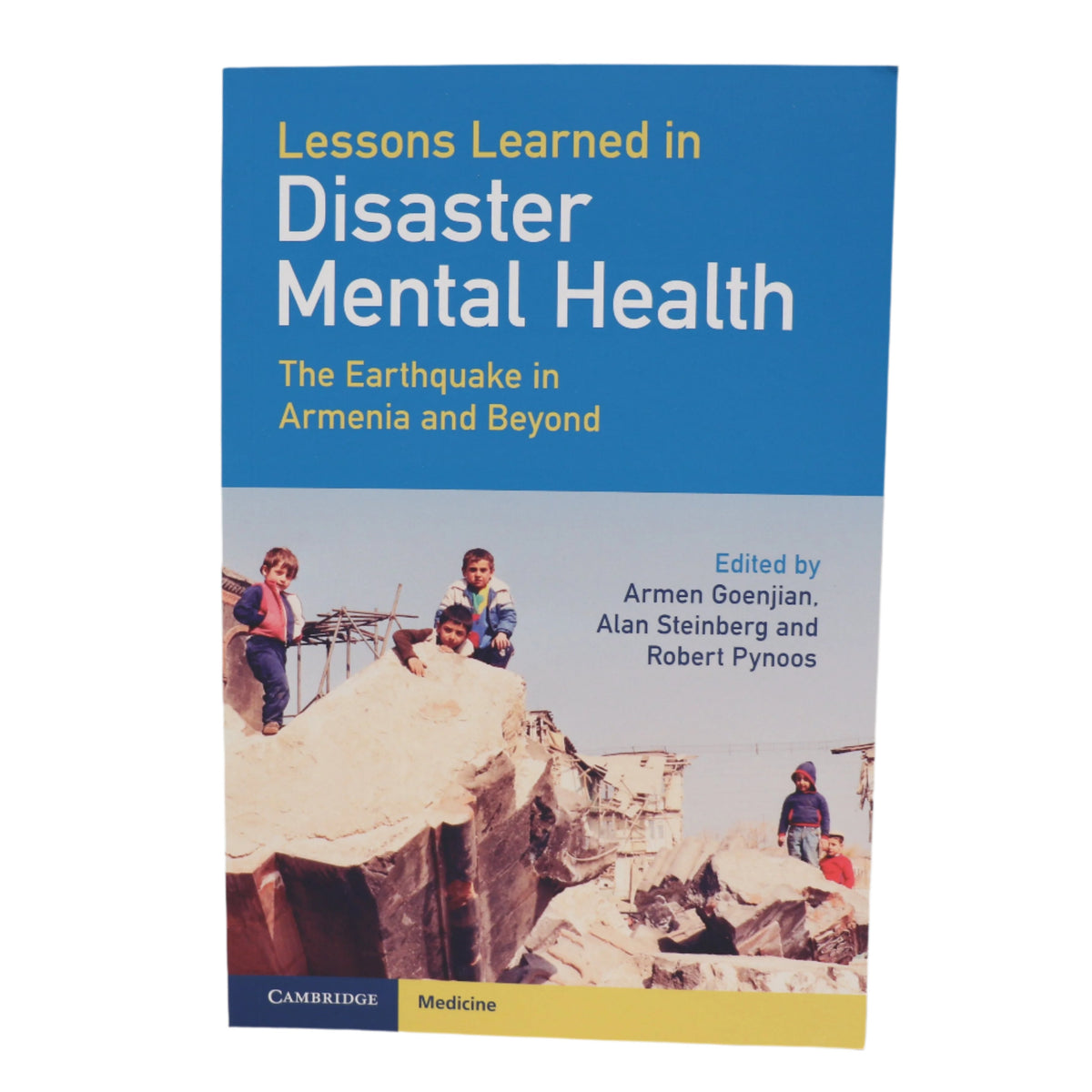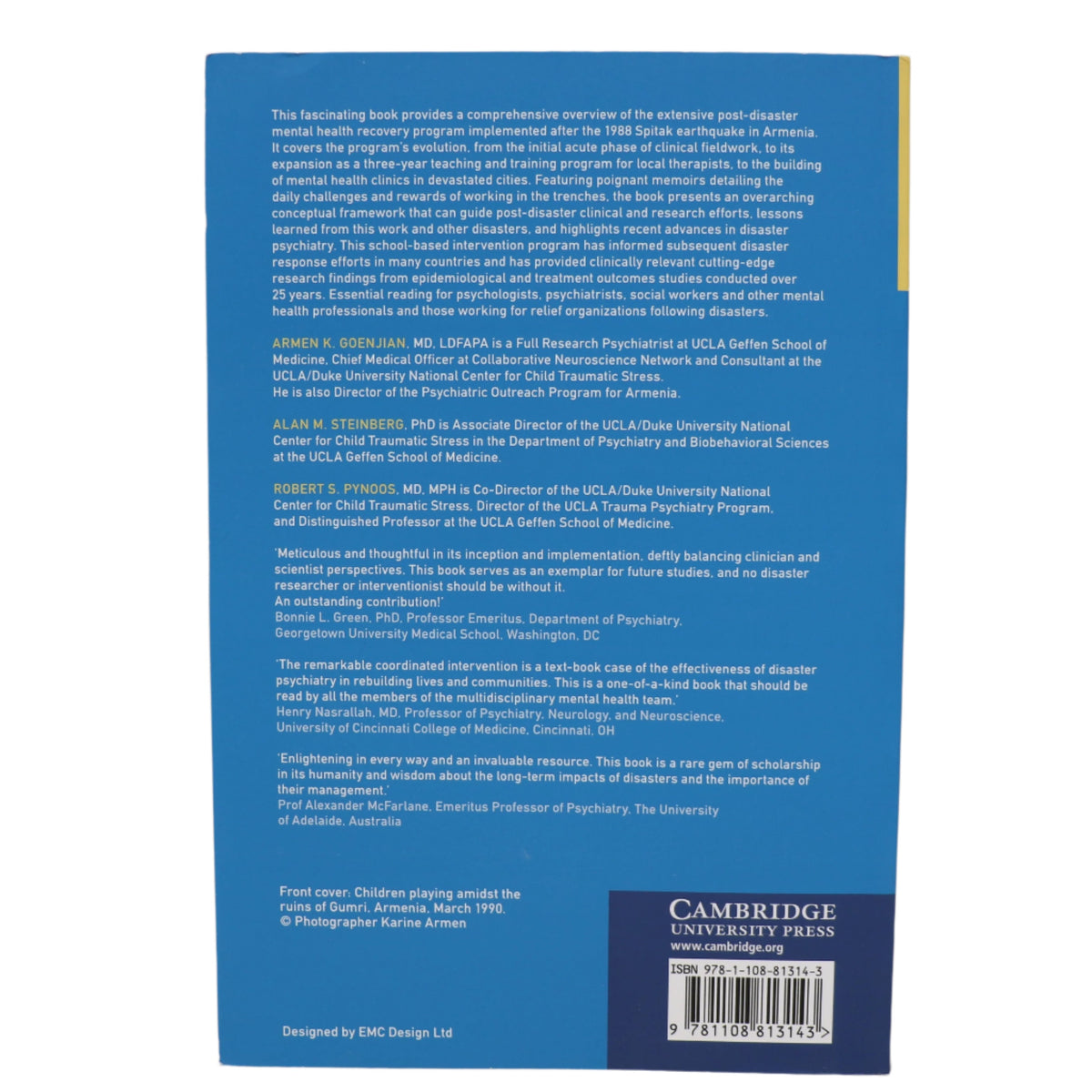Edited by , David Geffen School of Medicine; UCLA/Duke University National Center for Child Traumatic Stress, , UCLA/Duke University National Center for Child Traumatic Stress, , UCLA/Duke University National Center for Child Traumatic Stress.
This fascinating book provides a comprehensive overview of the extensive post-disaster mental health recovery program implemented after the 1988 Armenian earthquake. Covering the program's evolution, from the initial acute phase of clinical fieldwork, to its expansion as a three-year teaching and training program for local therapists, to the building of mental health clinics in devastated cities. Featuring poignant memoirs detailing the daily challenges and rewards of working in the trenches, the book presents a conceptual framework that can guide post-disaster clinical and research efforts, lessons learned from this work and other disasters, and highlights recent advances in disaster psychiatry. This school-based intervention program has informed subsequent disaster response efforts in many countries and has provided clinically relevant cutting-edge research findings from longitudinal and treatment outcomes studies conducted over 25 years. Essential reading for psychologists, psychiatrists, social workers and other mental health professionals and those working for relief organizations following disasters.
Reviews:
'In this exceptional volume, Drs. Goenjian, Steinberg, and Pynoos provide a prototype for responding to and studying mental health impacts of disaster on families and communities. As would be expected from their previous work, the project is meticulous and thoughtful in its inception and implementation, deftly balancing clinician and scientist perspectives. Beginning with a school-based intervention in Armenia, it followed participating youth across time using standard, reliable instruments and up-to-date methodologies. Clinical examples and anecdotes from participants and therapists bring the intervention and its challenges to life. Chapters are well-organized and didactic, providing a road map for conducting similar intervention research, with lessons learned and suggested prevention strategies. This book serves as an exemplar for future studies, and no disaster researcher or interventionist should be without it. An outstanding contribution!'
Bonnie L. Green - PhD, Professor Emeritus Department of Psychiatry Georgetown University Medical School Washington, DC
‘This inspiring book describes the uplifting transformation from a catastrophic earthquake that destroyed lives and property in Armenia, to the emergence of an effective mental health infrastructure, with clinical, research and educational impacts. The remarkable coordinated intervention is a text-book case of the effectiveness of disaster psychiatry in rebuilding lives and communities. The longitudinal treatment of traumatized children and families generated extremely useful insights into the epigenetic transgenerational transmission of PTSD and its overlap with anxiety and depression. This is a one-of-a-kind book that should be read by all the members of the multidisciplinary mental health team.’
Henry Nasrallah - Professor of Psychiatry, Neurology, and Neuroscience, University of Cincinnati College of Medicine, Ohio
‘Enlightening in every way and an invaluable resource. The immediate impact of disasters is dramatic and easily captured, but their enduring impact too often drifts from study and reflection. This book is a rare gem of scholarship in its humanity and wisdom about the long-term impacts of disasters and the importance of their management.’
Alexander McFarlane - Emeritus Professor of Psychiatry, The University of Adelaide, Australia
‘This book is a major contribution to our understanding of how the consequences of trauma unfold over time and the need for appropriate ongoing interventions. It teaches us how much practical work and trusted personal relationships are needed to successfully implement an outreach program under chaotic conditions. Their long-standing work on behalf of children and adolescents in school settings is unique and inspiring.’
Grete Dyb - M.D., Ph.D., Research Director, Norwegian Center of Violence and Traumatic Stress Studies, University of Oslo
- Gallery
- Description


Edited by , David Geffen School of Medicine; UCLA/Duke University National Center for Child Traumatic Stress, , UCLA/Duke University National Center for Child Traumatic Stress, , UCLA/Duke University National Center for Child Traumatic Stress.
This fascinating book provides a comprehensive overview of the extensive post-disaster mental health recovery program implemented after the 1988 Armenian earthquake. Covering the program's evolution, from the initial acute phase of clinical fieldwork, to its expansion as a three-year teaching and training program for local therapists, to the building of mental health clinics in devastated cities. Featuring poignant memoirs detailing the daily challenges and rewards of working in the trenches, the book presents a conceptual framework that can guide post-disaster clinical and research efforts, lessons learned from this work and other disasters, and highlights recent advances in disaster psychiatry. This school-based intervention program has informed subsequent disaster response efforts in many countries and has provided clinically relevant cutting-edge research findings from longitudinal and treatment outcomes studies conducted over 25 years. Essential reading for psychologists, psychiatrists, social workers and other mental health professionals and those working for relief organizations following disasters.
Reviews:
'In this exceptional volume, Drs. Goenjian, Steinberg, and Pynoos provide a prototype for responding to and studying mental health impacts of disaster on families and communities. As would be expected from their previous work, the project is meticulous and thoughtful in its inception and implementation, deftly balancing clinician and scientist perspectives. Beginning with a school-based intervention in Armenia, it followed participating youth across time using standard, reliable instruments and up-to-date methodologies. Clinical examples and anecdotes from participants and therapists bring the intervention and its challenges to life. Chapters are well-organized and didactic, providing a road map for conducting similar intervention research, with lessons learned and suggested prevention strategies. This book serves as an exemplar for future studies, and no disaster researcher or interventionist should be without it. An outstanding contribution!'
Bonnie L. Green - PhD, Professor Emeritus Department of Psychiatry Georgetown University Medical School Washington, DC
‘This inspiring book describes the uplifting transformation from a catastrophic earthquake that destroyed lives and property in Armenia, to the emergence of an effective mental health infrastructure, with clinical, research and educational impacts. The remarkable coordinated intervention is a text-book case of the effectiveness of disaster psychiatry in rebuilding lives and communities. The longitudinal treatment of traumatized children and families generated extremely useful insights into the epigenetic transgenerational transmission of PTSD and its overlap with anxiety and depression. This is a one-of-a-kind book that should be read by all the members of the multidisciplinary mental health team.’
Henry Nasrallah - Professor of Psychiatry, Neurology, and Neuroscience, University of Cincinnati College of Medicine, Ohio
‘Enlightening in every way and an invaluable resource. The immediate impact of disasters is dramatic and easily captured, but their enduring impact too often drifts from study and reflection. This book is a rare gem of scholarship in its humanity and wisdom about the long-term impacts of disasters and the importance of their management.’
Alexander McFarlane - Emeritus Professor of Psychiatry, The University of Adelaide, Australia
‘This book is a major contribution to our understanding of how the consequences of trauma unfold over time and the need for appropriate ongoing interventions. It teaches us how much practical work and trusted personal relationships are needed to successfully implement an outreach program under chaotic conditions. Their long-standing work on behalf of children and adolescents in school settings is unique and inspiring.’
Grete Dyb - M.D., Ph.D., Research Director, Norwegian Center of Violence and Traumatic Stress Studies, University of Oslo

